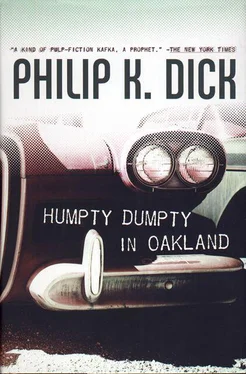I guess I killed him, he realized. I got him yesterday, at Harman’s house. When I said that about his bankbook being a fake. It took him a while, though. Thank God he didn’t drop to the floor then and there. Thank God the machinery ran on awhile longer, probably out of habit rather than intent.
Al thought, He always expected to get pinned under a car in his garage. That’s how he anticipated it. But that’s not how it worked out. He was killed by a flock of words. My words.
Starting up his car he drove off in search of a coffee shop where he could get breakfast.
On Sacramento Avenue he found a coffee shop which he knew, and there he ordered breakfast. Most of the customers were men; they read the sports section of the morning Chronicle , drank their coffee and ate their fried potatoes, bacon and eggs. The place was warm, yellow with light, and it cheered Al up. It made him feel less alone.
While he was eating, a Negro customer came up and seated himself beside him. “Ain’t you Mr. Miller?” the man said.
Al knew the man slightly; he had passed by the lot a couple of times. So he nodded.
The man said, “The doctor looking for you.”
“What doctor?”
“Doctor Do,” the man said, and then slid from his stool, and sidled on out of the coffee shop, onto the sidewalk.
As soon as he had finished eating, Al went to the pay phone booth and dialed Tootie’s number.
“Hey, man,” Tootie said, when he recognized Al’s voice. “They looking for you.”
“Who?”
“Them guys. What don’t mean you not a bit of good.”
“Sheoot,” Al said, falling into the vernacular.
“You better not say that,” Tootie said. “You better get it into you crappy head you in trouble.”
“Name the guys.”
“I don’t know whom them is. I just heard them looking for you to get you. Didn’t you done them something in? Be frank. They not pick on you for nothing.”
“Beats me,” Al said.
Tootie said, “What I hear, you kill someone.”
“Balls,” Al said.
“And that cost them a lot of money. Somebody I hear say it cost them people around a hundred thousand dollar.”
“There ain’t no hundred thousand dollar,” Al said angrily, caught up in spite of himself in Tootie’s mad account.
“What you going to do?” Tootie said.
“Nothing,” Al said.
“You better buy yourself a gun and lay low.”
“Balls on that,” Al said.
“Anyhow, I warn you,” Tootie said. “I hear this kind of stuff and it always prove out to be correct. I think whether you know it or not, you up against the big.”
“Okay,” Al said. He started to hang up.
“I hear you scratching around there,” Tootie said. “Getting ready to ring off.”
“I’ll go to the district attorney,” Al said, “and tell him all I know. They won’t touch me.”
“Who you kill?” Tootie said.
“I don’t know.”
“Sure you know.”
“Just some guy that got in my way.”
“You daffy,” Tootie said. “I ring off myself.” The phone clicked. Presently Al hung up his own receiver and left the booth.
Good of him to warn me, he said to himself.
Maybe he’s right, he thought. I should buy a gun and lay low. But where can I go? The Harman organization has my complete record, all the facts about me: every place I’ve lived, where I was born, where my wife works, what I’ve done since I was in grammar school. They can probably turn it over to a psychologist and he can predict exactly what I’ll do. They’ll know exactly where to find me, what street, what number, which particular room. That’s what modern industrial technology can do.
He bought a Chronicle , and, reseated at the counter, began to read over the “men wanted” ads. There were no jobs worth talking about. I could be a salesman, he decided. Or service penny-gum machines. He read the personals then, and after that the personals in business. Look how some guys stay alive, he thought. I will come into your own home and hypnotize you into not smoking. Or if you want, I will show up at your kid’s birthday party and entertain with puppets. His game went back to the personals. “Inside dope on bughouse,” he read. “Thank St. Jude for saving my heirloom furniture.” Christ. He put the paper away.
Early in the afternoon Julie showed up at their apartment. He had been taking a nap. Astonished to see her so early, he sat up. But before he could speak, Julie said, “I’ve been fired.” She began taking off her shoes and stockings.
“Why?” he said.
Julie said, “Some customer called in and told the office manager that I didn’t believe in God. He had me come into his office and he asked me and I told him it was so, but it wasn’t any of Western Carbon and Carbide’s business. But he said the morals of the employees were Western Carbon and Carbide’s business. And he also said that they never found that college girls worked out. They’re never satisfied with their jobs. They’re always troublemakers.” She hung up her coat in the closet.
So Tootie was right. They were out to get him.
“Listen,” he said. “How would you like to leave the Bay Area?”
“And go where?”
“Beats me,” he said. “But we’ll work it out.”
“There’re lots of jobs in the Bay Area,” Julie said, going into the kitchen and beginning to pile dishes into the sink. “I won’t have any trouble. I’ve already listed myself at some of the employment agencies. You have to expect this sort of thing. Anyhow, you have your job.”
“No,” he said.
“No what? What do you mean? You mean after one day you’re not working there anymore, for that man?” She ceased working with the dishes and came into the bedroom to stand facing him. “How come you’re home? Why aren’t you at work?”
Al said, “We’re in trouble.”
“You held that job just one day, didn’t you?” Julie said. “That good job.”
He nodded.
“You quit?”
“Yes,” he said finally.
“Will you tell me why?”
“I don’t know why,” he said. “I know what happened, but I don’t know why. You have to take my word. There wasn’t anything else I could do.” He faced her, his hands in his pockets. His wife had folded her arms tightly before her, as if she were cold. Her face had a withered, old expression, and all her features, her nose and eyes and mouth, became by degrees smaller. The bones themselves seemed to shrink. As if, he thought, the life-force inside her were thinning out. Turning to air. Vanishing. Puffing away as she breathed in and out. Maybe that was all it was anyhow, merely air. Air in all of them, that kept them alive.
“I’m going to divorce you,” she said.
He made a move toward her, to reassure her. To warm her back up to some kind of life. But she drew away. She avoided him.
“This is no time for this,” he said. “This sort of thing.”
“I suppose you’re going to hit me,” she said. “Like you did that poor man.”
“What poor man?”
“That drunk who got onto your lot, and you hit him.”
He did not remember. He had no idea what she was talking about. “We’re both out of work,” he said, “and we’re going to have to start over, probably somewhere else entirely. But we’ll make it back up. I learned a lot from this.”
“No,” she said. “We’re through.”
After a time he said, “I’ll tell you what. I’ll make a deal with you. Give it one month. If we—” He hesitated.
“Yes,” she said with bitterness. “If we don’t find some sort of job. We. Not you.”
He said, “If I don’t have something worthwhile in a month, then we’ll break up.”
“I can’t make a deal with you,” Julie said, “because—do you want to know why? Can you face the truth? You’re not honest. You can’t be trusted.” She moved farther away, as if afraid. Dreading his reaction. But he did nothing. “Now hit me,” she said. “And prove how reliable you are. How honest you are.”
Читать дальше










